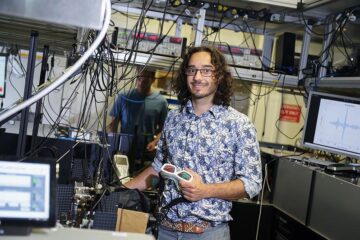Treating Alzheimer´s disease by targeting Amyloid ß-nitration – A novel therapeutic/diagnostic/ prophylactic approach

Part of the inflammatory response in Alzheimer´s disease (AD) is the upregulation of the inducible nitric oxide synthase NOS2 resulting in increased NO production. NO contributes to cell signaling by inducing posttranslational protein modifications. Under pathological conditions there is a shift to the formation of protein tyrosine nitration by secondary products like peroxynitrite and nitrogen dioxide.
The invention is based on the finding that amyloid ß (Aß) is nitrated at tyrosine 10 in AD-brains. Nitration accel-erates its aggregation and is present in Aß plaques. Injection of the nitrated protein into the brain of APP/PS1 transgenic mice leads to ß-amyloidosis. An antibody specific to the nitrated form of Aß has been developed. A therapeutic approach interfering with the nitrated Aß (rather than with the native Aß-peptide) may provide a very specific treatment with a reduced risk of side-effects. Commercial Opportunities: The invention offers a novel approach for an early diagnosis of AD. The invention also opens new avenues for developing either NCEs or biologicals interfering with the nitrated Aß. Antibody-based therapeutic approaches (e.g. passive/active vaccination) are currently been developed. Prophylactic approaches are also conceivable. On behalf of University of Bonn, PROvendis offers access to rights for commercial use as well as the opportunity for further co-development.
Weitere Informationen: PDF
PROvendis GmbH
Tel.: +49 (0)208/94105 10
Ansprechpartner
Dipl.-Ing. Alfred Schillert
Media Contact
Alle Nachrichten aus der Kategorie: Technologieangebote
Neueste Beiträge

Neue universelle lichtbasierte Technik zur Kontrolle der Talpolarisation
Ein internationales Forscherteam berichtet in Nature über eine neue Methode, mit der zum ersten Mal die Talpolarisation in zentrosymmetrischen Bulk-Materialien auf eine nicht materialspezifische Weise erreicht wird. Diese „universelle Technik“…

Tumorzellen hebeln das Immunsystem früh aus
Neu entdeckter Mechanismus könnte Krebs-Immuntherapien deutlich verbessern. Tumore verhindern aktiv, dass sich Immunantworten durch sogenannte zytotoxische T-Zellen bilden, die den Krebs bekämpfen könnten. Wie das genau geschieht, beschreiben jetzt erstmals…

Immunzellen in den Startlöchern: „Allzeit bereit“ ist harte Arbeit
Wenn Krankheitserreger in den Körper eindringen, muss das Immunsystem sofort reagieren und eine Infektion verhindern oder eindämmen. Doch wie halten sich unsere Abwehrzellen bereit, wenn kein Angreifer in Sicht ist?…

















